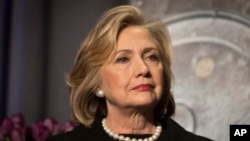Hillary Clinton’s presidential campaign is on the defensive over recent news reports questioning possible conflicts of interest in foreign donations to the Clinton Foundation.
The campaign has had to deal with several stories detailing revelations about the fundraising practices of the Clinton Foundation and even the speeches given around the world by her husband, former President Bill Clinton.
An extensive report in the New York Times detailed a donation from a Canadian mining executive whose company was sold to Russia's atomic energy agency, Rosatom. The sale included one of the largest uranium mines in the U.S.
The donations to the Clinton Foundation were not publicly disclosed and came at a time when the deal had to be approved by the State Department, then under the leadership of Secretary of State Clinton.
The revelations have been sparked in part by a new book, Clinton Cash, by Peter Schweizer, a fellow at Stanford University’s conservative Hoover Institution.
Clinton announced earlier this month that she is seeking the Democratic presidential nomination for the 2016 election.
A spokesman for the Clinton campaign, Brian Fallon, told the Times that there is not “a shred of evidence” that shows Clinton ever took action as secretary of state to support the interests of donors to the Clinton Foundation.
The revelations sparked questions at the White House and a statement of support from presidential spokesman Josh Earnest.
“At this point there has not been any evidence presented that would prompt the president or anybody at the White House to be unsettled by Secretary Clinton’s conduct as secretary of state,” he said. “In fact, everyone here at the White House including the president continues to be very proud of her services to this country as secretary of state of the United States.”
Republicans seize on revelations
Several Republican presidential contenders have raised questions in recent weeks about some of the foreign donations for the Clinton Foundation and analysts expect the issue to remain vibrant as the 2016 presidential campaign picks up momentum.
John Fortier, political analyst at Washington’s Bipartisan Policy Center, predicts the questions will continue to swirl for some time about perceptions of conflict of interest and transparency.
“There are some questions about it and especially because it involves foreign governments and some that really don’t look so good, I think these questions will continue for a while,” Fortier said.
Fortier still sees Clinton as a top presidential contender with many political advantages in the upcoming presidential race.
That view is also held by analyst Matthew Dallek of George Washington University.
Still, Dallek said previous revelations about Clinton’s use of a private email server while secretary of state had already caused some ripples of concern among Democrats about her vulnerability to Republican attacks.
“It makes some Democrats feel like, what else is there?” he asked. “What controversy is next? And what happens if something else occurs? So it does create a kind of churning, but at the same time I don’t really see anybody out there right now. You know, what is the universe of alternatives?”
More Benghazi testimony looms
Clinton has also been asked to testify before a special House committee investigating the 2012 terrorist attacks in Benghazi, Libya, that resulted in the deaths of four Americans, including U.S. Ambassador Chris Stevens.
Clinton has already testified before Congress twice before on the Benghazi attacks.
But committee chairman Trey Gowdy, a Republican from South Carolina, wants Clinton to answer questions about her use of a private email account as soon as next month.
Clinton has indicated previously she is willing to testify before the committee. But some congressional Democrats say they will be watching to make sure Republicans don’t try to turn the committee probe into a partisan witch hunt in an attempt to influence the 2016 election.
